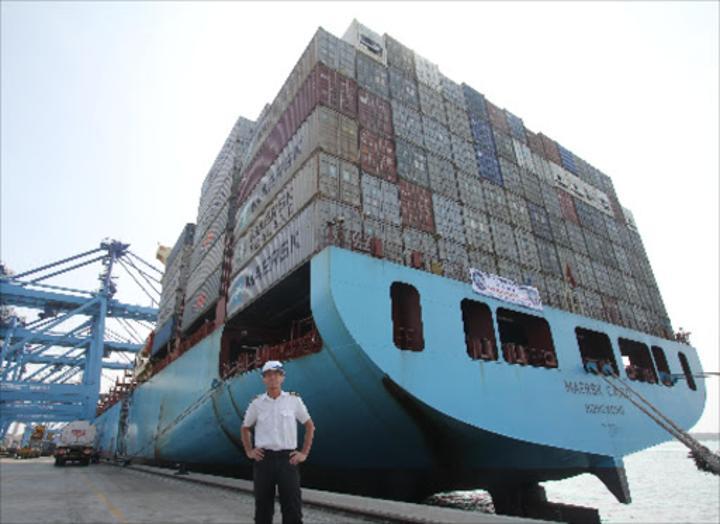Africa-Press – Kenya. Danish shipping and logistics firm- Maersk has introduced two more surcharges for freight services on its key routes including Kenya, exposing traders to higher costs and pricey goods for consumers.
This is despite the Kenya Maritime Authority’s directive to hold the implementation of the new charges to allow dialogue with stakeholders.
The regulator has written to the shipping line twice, amid an outcry from the Shippers Council of Eastern Africa (SCEA), which is advocating for the interest of cargo owners (importers and exporters) in the region.
Maersk which accounts for the biggest share of imports and exports through the Port of Mombasa (28% of total throughput), has introduced emergency surcharges pegged on the Red Sea situation and peak season surcharges that range between $300 (Sh38, 931) and $2,000 (Sh259, 540) depending on the size and type of container, and destination.
This is in addition an earlier introduction of a surcharge on containers of between $13 (Sh1, 687) and $151 (Sh19, 595) depending on the size and type of container, which came into effect on July 15.
“In order to keep providing you with our global services, Maersk is increasing the peak season surcharge for United Arabs Emirates, Bangladesh, Bahrain, Bhutan, India, Iraq, Jordan, Kuwait, Sri Lanka, Maldives, Nepal, Oman, Pakistan, Qatar, Saudi Arabia, Yemen to Djibouti, Tanzania, Somalia, Kenya, Sudan, effective August 1 2024,” parent company A.P Moller had said in a customer advisory.
The rates are also subject to other applicable surcharges, including local charges and contingency charges, the firm noted.
Maersk said the impact of the Red Sea crisis has gone beyond the Asia-Europe network and has affected its worldwide portfolio.
The surcharges have been effected despite KMA’s call for their suspension.
In a letter to Maersk, KMA had termed the adjustment as being against the process of reviewing tariffs, and wanted the company to provide reasons for the review or introduction of the rates, justification of the review, the level or magnitude of the amount of the reviewed or introduced charges and duration to be applied.
Maersk had also been asked to ascertain or quantify loss suffered in its business to warrant the decision.
KAM was to then consult relevant stakeholders to ascertain the situation in the market and hold talks with the shipping lines to find a way forward.
“Your institution is aware that part of the application process for issuance of licence/certification is to submit tariffs to be applied during the period of operations to the Authority. It is therefore expected that in the event of any change in tariffs, a submission of such changes should be made,” KAM said in a letter to the shipping line, directing it to suspend “with immediate effect” the surcharges.
The shipping line is however yet to suspend the new charges as they remain in force.
“SCEA has been waiting for Maersk to rescind the decision…very difficult times for shippers, three increases in less than one month,” the shippers council CEO Agayo Ogambi posed.
Speaking to the Star on the telephone, Ogambi said the move would lead to an increase in the cost of doing business, with other shipping lines likely to follow suit.
Other key players at the Port of Mombasa includes world’s leading container carrier-Mediterranean Shipping Company (MSC) which accounts for 18.9 per cent of total throughput and China’s CMA CGM which accounts for 13.9 per cent of containers at Mombasa.
The new surcharges will increase the cost of exporting a 20ft container from the Port of Mombasa by more than 13 per cent, shippers warned, rising the overall shipping costs.
From an industry perspective, SCEA said the initial surcharge alone will cost the industry an additional Sh27.5 million to export 20ft containers annually through Maersk, from Sh204.9 million to Sh232.4 million, based on the 2023 volumes handled by Maersk.
The industry will also pay an additional Sh51.2 million for 40ft containers annually from Sh486.8 million to Sh537.9 million.
Similarly, it will cost the industry an additional Sh501.9 million for importation of 20ft containers in a year from Sh3.3 billion to Sh3.8 billion) and Sh653.3 million more to import 40ft containers annually, from Sh5.3 billion to Sh5.9 billion), based on Maersk 2023 throughput share and current dollar rates.
“These new surcharges will adversely impact ongoing initiatives to promote a modal shift from air to sea freight and which is already gaining traction, especially against the backdrop of climate and carbon reduction initiatives and resultant market demands especially in Europe,” Ogambi said.
For More News And Analysis About Kenya Follow Africa-Press






